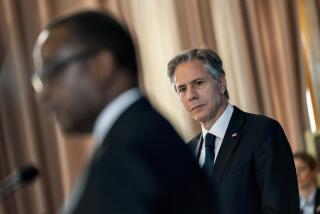Albright Urges Political Opening in Congo
- Share via
KINSHASA, Congo — Because the United States believes that the vast but crumbling Congo is the key to the future of much of Africa, Secretary of State Madeleine Albright on Friday undertook the daunting task of trying to cajole its new government into opening the political system and ending three decades of rampant corruption.
In response, Laurent Kabila, this nation’s new president, told Albright mostly what she wanted to hear in their formal meetings.
But then, at the end of their joint news conference, he shocked the Americans by asserting his right to jail political opponents for “incitement” and uttered a sardonic phrase, “Vive la democratie.”
The incident illustrated just how difficult it will be for Albright and the United States to forge the close relationship with Kabila that will let Washington guide his regime as it attempts to govern a nation that many consider ungovernable.
Kabila and his allies seized power in May by ousting dictator Mobutu Sese Seko, who had beggared one of Africa’s biggest and potentially richest countries, leaving it a poor hulk with few and bad roads, deplorable communications, no functioning economy and a history of misrule.
Albright, ignoring this nation’s notoriously decrepit telephone system, said brightly at one point Friday that she and Kabila had “decided to give each other our telephone numbers so we can keep in touch when problems come up. I plan to use the phone fairly often, and I hope he does too.”
But the mood changed abruptly when a reporter asked her about an incident last week in which, according to news accounts, organizers of a political meeting were arrested and beaten.
Albright responded that she had stressed to Kabila “the importance of inclusion and the importance of elections and the importance of dealing with wide political views.”
Kabila then grimaced, demanding to know the name of the political foe who had been arrested, an individual identified as longtime dissident Zahidi Ngoma.
Kabila snapped at reporters: “He is not a political leader. Do you call ‘political leader’ people who come on the street to incite people?”
He accused Ngoma of “conspiring” with an unnamed foreign embassy and insisted that people committing such acts will continue to be jailed.
After the news conference, James P. Rubin, Albright’s spokesman, issued a statement explaining that Albright was unfamiliar with Ngoma’s case but intended to find out about it.
“Obviously every government has the right to counter those who would incite violence,” Rubin said. “But basic to freedom of speech and freedom of association is the right of individuals to state their views freely and openly to others. On this issue, clearly the government of the Congo must improve its record.”
*
Washington had ignored the late Mobutu’s corruption and human rights violations throughout the Cold War because he was considered a bulwark against communism and the spread of Soviet influence.
Critics now complain that the administration is making the same sort of mistake with Kabila, overlooking his shortcomings because he leads a strategic country, which, among its other problems, has been riven by the ethnic killings and strife that have left hundreds of thousands of rival Tutsis and Hutus dead in Congo and its neighboring countries, especially Rwanda.
“There is no doubt that what happens in this vast country will do much to shape the future of central, eastern and southern Africa,” Albright said. “We have an opportunity to build a new relationship between our two nations.”
A senior State Department official, however, described Congo in more stark terms: “After 30 years of Mobutu-ism, there is no infrastructure, no responsible government and not even a real, clear-cut concept of what responsible governance is.”
Dealing with such problems would be an ordeal for any government, the official said, but it will be even tougher for Kabila, who heads “an alliance of disparate political and military forces that have never worked together and never governed anything.”
Congo, more than twice the size of Texas and bordered by nine countries, is too big to ignore, the official said, noting: “The United States cannot afford to be indifferent to the outcome. We have made a policy decision that rather than sit on the sideline and keep score, we will use our influence” to push Kabila toward democracy and economic reform.
The official expressed optimism that Kabila can forge an effective government “with some experience, some seasoning and a little bit of coaching and hand-holding” by the Americans.
Albright said the administration will ask Congress to lift a ban on aid to Congo left over from the Mobutu era to clear the way for between $35 million and $40 million “to assist the Congolese people and their government in building democratic institutions and governing capacity . . . [including] infrastructure programs in areas such as health, sanitation and finance.”
Although far short of the billions of dollars Congo needs, such a package would be a substantial vote of confidence in the Kabila regime. And for that very reason, it may be controversial in Congress. Albright warned Kabila that his human rights performance will weigh heavily with U.S. lawmakers.
Kabila postponed the start of a planned trip to China to meet Albright. The meeting had been scheduled for Thursday night, but Albright was delayed by a storm.
Later in the day, Albright flew to Angola, where she visited the Cabinda oil field and met President Jose Eduardo dos Santos.
More to Read
Sign up for Essential California
The most important California stories and recommendations in your inbox every morning.
You may occasionally receive promotional content from the Los Angeles Times.













